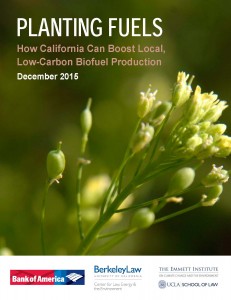Biofuels could offer an important solution for reducing greenhouse gas emissions from the transportation sector. Depending on the plant (or grease) feedstock, they can blend in with existing fuel or serve as separate liquid fuels to power airplanes, long-distance trucks, and other vehicles.
Today on Your Call on KALW 91.7 FM in San Francisco, we’ll discuss the prospects for more low-carbon biofuel deployment, as well as the potential carbon downside of some types of biofuels. Joining me will be:
- Daniel Kammen, Professor of Energy at the University of California, Berkeley, with parallel appointments in the Energy and Resources Group, where he serves as Chair of the Goldman School of Public Policy and directs the Center for Environmental Policy, and the department of Nuclear Engineering.
- Dr. Jeremy Martin, Senior Scientist and Director of Fuels Policy at Union of Concerned Scientists, where he evaluates the impact of biofuels and fuel policy.
You can stream it live or listen to 91.7 FM in San Francisco. Call in with questions or comments!
 Last week I keynoted the California Biodiesel Conference in Sacramento, and I learned a lot from the panel presentations. The organizers have how made all the slides available here (scroll down a bit).
Last week I keynoted the California Biodiesel Conference in Sacramento, and I learned a lot from the panel presentations. The organizers have how made all the slides available here (scroll down a bit).
You can learn about the Governor’s Office priorities for funding more in-state biodiesel production, why gasoline consumption is projected to decline but diesel consumption to rise in the coming decades, and why biodiesel is one of the fastest growing biofuels in use in California, among other interesting tidbits.
And if that’s not enough, read our Berkeley / UCLA Law report Planting Fuels to learn about policies that could boost in-state production even more.
While electrification of transportation will be desirable for passenger vehicles and some goods movement, ultimately we’ll still need biofuels for many transportation needs, from long-haul trucking to aviation. Low-carbon biodiesel will therefore be a key part of our fuel mix for the foreseeable future.
For those in the Sacramento area, I’ll be giving the keynote address this afternoon at the 2016 California Biodiesel Conference (you can register and see the agenda here). I’ll discuss global and subnational trends on carbon policies, as well as California policies that could boost in-state production to meet half of the state’s biofuel needs. Much of the talk will be drawn from our recent UC Berkeley/UCLA Law report Planting Fuels released in November.
Just in time for our lunch event on biofuels today, the Navy this week announced a major investment in biofuels for its fleet, per the San Diego Union-Tribune:
This Wednesday, there surely will be tears, hugs and excitement as sailors begin another deployment to the world’s hotspots. On the surface, it will be a replay of a common occurrence in any Navy town when sailors go to sea, but in the ships’ gas tanks will be fuel made from renewable resources that has officials back at the Pentagon exuberant.
“Underway on beef-fat power” might not have the same ring as “Underway on nuclear power,” the historic message the Nautilus submarine beamed when it left the pier 61 years ago today. Nonetheless, the Navy is trumpeting the use of renewable biofuels as a game-changer.
In 2009, Navy Secretary Ray Mabus announced that the Navy and Marine Corps would get half of their power from non-fossil fuel sources by 2020, and that the Navy would deploy an entire carrier strike group using biofuels by 2016.
Since then, every type of aircraft in the service’s hangars and every class of ship in the Naval Vessel Register has flown or gone to sea with biofuels made out of beef fat, municipal waste, palm oil, algae or camelina, a plant in the mustard family.
Critics may object to the higher cost, but for the Navy, it’s a national security issue. No military wants to be wholly dependent on foreign sources of fuel, and biofuels mean local production and a hedge against volatile oil prices.
For California, the military investment also means a guaranteed market for a nascent biofuel industry that can really use the help. Oil prices won’t stay low forever, so keeping our biofuel industry alive to step in when needed is important economically, environmentally, and for national security, too.


